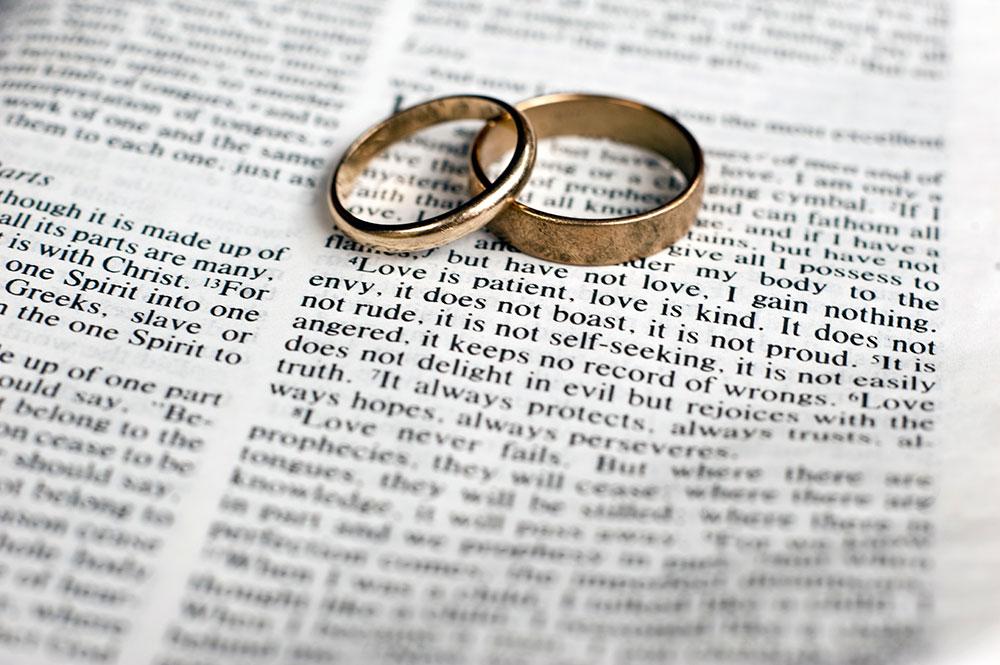Theologically conservative Christians are widely perceived as hostile to gays. And it is largely our own fault.
Many of us have actually been homophobic. Most of us tolerated gay bashers. We did not deal sensitively and lovingly with young people in our churches struggling with their sexual orientation. We even had the gall to blame gay people for the collapse of marriage in our society, ignoring the obvious fact that the main problem by far is that many heterosexuals do not keep their marriage vows. We have often failed to distinguish gay orientation from gay sexual activity.
If the devil had designed a strategy to discredit the historic Christian position on sexuality, he could not have done much better than what the evangelical community has actually done.
Some believe the track record of conservative Christians is so bad that we should just remain silent on this issue. But that would mean abandoning what I believe is clear biblical teaching. It would mean forgetting the nearly unanimous two-millennia-long teaching of Catholic, Orthodox and Protestant Christians. And it would mean failing to listen to the vast majority of contemporary Christians who now live in the Global South.
Goodness and beauty
The primary biblical case against homosexual practice is not the few texts that explicitly mention it. Rather, it is the fact that again and again the Bible affirms the goodness and beauty of sexual intercourse—and everywhere, without exception, it is sexual intercourse between a man and a woman committed to each other for life.
In the creation account in Genesis, the “man and his wife were both naked and they felt no shame” (Genesis 2:25). Their sexual attraction is good and beautiful. A whole book—Song of Solomon—celebrates the sexual love of a man and a woman. Many Old Testament laws and proverbs discuss the boundaries for sexual intercourse—and always it must be between a man and a woman. Jesus celebrates marriage (John 2:1-11) and tightens the restrictions on divorce—again, always in the context of a man and a woman. Paul urges a husband and wife to satisfy each other’s sexual desires (I Corinthians 7:1-7).
This affirmation of sex within the life-long commitment of a man and a woman provides the context for understanding the few texts that explicitly mention same-sex intercourse: Leviticus 18:22, 20:13; Romans 1:24-27; I Corinthians 6:9; I Timothy 1:10.
Leviticus condemns lying “with a man as one lies with a woman.” It says nothing about motives or types of homosexual acts (rape or cult prostitution). It simply condemns, unconditionally, all sex between two males.
Reaffirmed or ignored?
But Christians today do not condemn every sexual activity denounced in Leviticus. So we must turn to the New Testament to see what prohibitions it ignores or sets aside and what ones it reaffirms.
The longest discussion is in Romans 1, where Paul argues that non-Jews without the law exchanged the truth about God revealed in nature for a lie. God’s punishment was to give “them over to the sinful desires of their hearts to sexual impurity.” Paul then cites several illustrations, including women exchanging “natural sexual relations for unnatural ones” and men committing “shameful acts with other men.”
Numerous authors argue that Paul does not mean all homosexual intercourse is wrong. Perhaps Paul only condemns pederasty (an older male with a boy was common), or cult prostitution, or uncommitted same-sex activity. Or perhaps Paul was thinking of the common view that it was a disgrace for a man to play the part of a woman because women were inferior. But the text does not say any of those things. It simply condemns same-sex intercourse.
Contrary to God’s will
In I Corinthians 6:9, Paul lists a number of sinful activities and declares that such “wrongdoers” will not inherit the kingdom. The list includes the greedy, slanderers, drunkards and malakoi and arsenokoitai. (It is tragic that many Christians spend much more time condemning the sexual activity mentioned in these two Greek words than they devote to opposing slander and greed.)
But what do malakoi and arsenokoitai mean? Many scholars agree with Richard Hays, who points out that malakoi was often used in Hellenistic Greek as slang to refer to the passive (often younger) partner in homosexual activity. Arsenokoitai (also used in I Timothy 1:10) seems to be a compound word first used by Paul. It comes from arsen (male) and the verb koitē (lying with)—a male lying with a male. It is likely that this newly coined word emerged from reading Leviticus 18:22 and 20:13, because the same two Greek words used in Paul’s compound word arsenokoitai are in the Greek translation of Leviticus 18:22 and 20:13.
Even scholars who defend homosexual practice by today’s Christians agree that wherever the Bible refers to homosexual practice, it condemns it as contrary to God’s will.
What’s required today?
But Christians today do not take everything in the New Testament (for example, head coverings for women) as commands for today. Some Christians advance a number of arguments to claim that (at least in the case of a monogamous, life-long commitment) same-sex intercourse is morally acceptable:
- A great deal of homosexual intercourse in Greco-Roman society was pederastic (a dominant older male with a passive younger male) and not infrequently involved slavery and rape.
- The Greco-Roman world knew nothing about a life-long orientation or a long-term male-male sexual partnership.
- Many people in Paul’s time condemned homosexual intercourse because it required a male to play the role of a woman, which was considered a disgrace because males were superior.
- Some Greco-Roman and Jewish writers condemned homosexual intercourse because it could not lead to procreation.
Obviously, a mutually supportive, life-long, caring, same-sex relationship is very different from the relationships described above. And we do not believe sexual intercourse must be for the purpose of procreation.
But two things are important to note. First, Paul never argues that homosexual practice is wrong because it is pederastic or oppressive or wrong for a male to play the role of a woman. He simply says it is wrong. Second, there are examples in ancient literature that talk about a long-term (even life-long) homosexual partnership, and a number of ancient authors talk about a life-long same-sex orientation.
Slavery and women
Some argue for abandoning the historic Christian teaching on same-sex intercourse by pointing out that Christians no longer accept what the Bible says about slavery and the inferiority of women. But in the case of both, a trajectory within Scripture points toward a very different view.
What Paul asked Philemon to do when his runaway slave Onesimus returned was so radical that, if widely implemented, it would end slavery. On women, Jesus defied male prejudices and treated women as equals. Women were apostles (Romans 16:7) and prophets (Acts 21:9; I Corinthians 11:5) in the early church. When Christians reject slavery and affirm the equality of women, they extend a trajectory that begins in the biblical canon. In the case of same-sex intercourse, nothing even hints at such a change.
Praise for celibacy
If the biblical teaching on sexual intercourse is decisive, then celibacy is the only option for those not in a heterosexual marriage. But many argue that celibacy is impossible or that the abundant life God wills for everyone involves sexual fulfillment.
Such an argument, however, would have astonished Jesus and Paul—both unmarried celibates. Both praised a celibate life. Furthermore, the historic position that sexual intercourse must be limited to married heterosexuals demands celibacy for vastly more people than just the relatively small number with a same-sex orientation. Widows and widowers, and those who long for marriage but cannot find a partner, are also called to celibacy.
In addition to the unanimous biblical teaching, church history’s nearly unanimous condemnation of same-sex practice and the same teaching by churches that represent the overwhelming majority of Christians in the world today ought to give us great pause before we bless same-sex intercourse.
This is not enough
But simply repeating biblical truth is not enough. We need a substantially new approach:
- First, we must nurture Christian men and women who keep their marriage vows and model healthy family life.
- Second, we need to love and listen to gay people, especially gay Christians, in a way that most of us have not done.
Mennonites must also take the lead in several other vigorous activities related to gay people.
We ought to condemn and combat verbal or physical abuse of gay people.
We ought to develop programs so that our congregations are known as the best places in the world for gay and questioning youth (and adults) to seek God’s will in a context that embraces, loves and listens, rather than shames, denounces and excludes.
Surely, we can ask the Holy Spirit to show us how to teach and nurture biblical sexual practice without marginalizing and driving away from Christ those who struggle with biblical norms.
The best in the world
Our churches should be widely known as places where gay people can be open about their orientation and feel welcomed. Of course, Christians who engage in unbiblical sexual practices (whether heterosexual or gay) should be discipled (and disciplined) by the church and not allowed to be leaders or members in good standing if they persist in their sin. The same should be said for those who engage in unbiblical practices of any kind.
However, Christians who acknowledge a gay orientation but commit themselves to celibacy should be eligible for any role in the church their spiritual gifts suggest. Imagine the impact if Mennonite churches were known to be the best places in the world to find love, support and full affirmation of gifts if one is an openly gay, celibate Christian.
Ronald J. Sider is a member of Oxford Circle Mennonite Church in Philadelphia, Pa., and a professor at Palmer Seminary of Eastern University. This article is a summary of a chapter in a forthcoming book by Sider and Ben Lowe, A Faith For All Generations (Baker, © 2016, http://www.bakerpublishinggroup.com.). Used by permission.
—Posted Jan. 14, 2015
For reflection and group discussion, go to the discussion questions related to this article.
See also: "A Difficult Debate"









Leave a Reply
You must be logged in to post a comment.